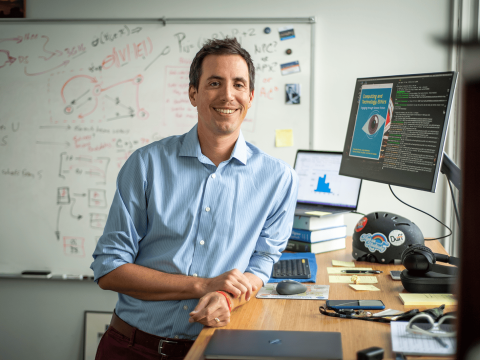AI professor at Tulane wins CAREER award from National Science Foundation
Nicholas Mattei, associate professor of computer science in the School of Science and Engineering at Tulane, has received a CAREER award from the National Science Foundation. The award comes with $600,000 for his research over the next five years.
Mattei uses artificial intelligence, machine learning and data science to study group decision-making, like voting and resource allocation, and its application in many real-world contexts. His research looks at the way people actually make decisions, which is more complicated than we might think. “We are not necessarily automatons,” Mattei said, “and we’re not very good at articulating the things that we want all the time.”
AI can leverage lots of background information about a decision to identify patterns that we might not recognize, which can help people factor in the most important data and make the best decisions for the group.
Mattei was careful to specify that his research should be used to enhance human decision-making, not replace it. “We don’t want to replace things,” said Mattei. “Part of the ‘human-centered’ push is to ensure that decisions are made with the human and the AI as a team, and that those decisions are auditable and modifiable by humans.”
Part of Mattei’s work is with the local community through Tulane’s Center for Community-Engaged Artificial Intelligence and the Jurist Center on Artificial Intelligence. Both of these centers work with nonprofits, community members and the City of New Orleans to study and develop AI systems that are fair and transparent. This grant will allow the centers to expand the scope of their projects including creating new courses at Tulane and working with more community partners across the region.
Mattei has always been interested in AI. “One of the things that got me into it was when Deep Blue beat Garry Kasparov in chess back in the mid-’90s,” he said.
He has seen interest in AI bloom from when he was an undergraduate student at the University of Kentucky with ten people in his AI class to that same class having over 100 students today. He also received his PhD from the University of Kentucky and has worked both in and out of academia, including at the Commonwealth Scientific and Industrial Research Organization (CSIRO) in Australia, NASA, and IBM.
“Getting to put together a team that’s very interdisciplinary and community focused is something you can do at a university that you can’t really do as much in an industry research lab,” said Mattei. With his work on ethics in technology, he has been able to collaborate with philosophers and ethicists as well as computer scientists, which has made a large impact on his work at Tulane and within the local community.
He sees that interdisciplinarity reflected in the students taking his computer science classes. “We get a lot of students from business, from philosophy, from economics, that have another major but want to understand AI,” Mattei said. “Almost half of our computer science majors have other majors outside of the School of Science and Engineering.”
Mattei’s goal is for AI research, and research that uses AI, to continue to grow at Tulane. “It’s not just, ‘Let’s ask ChatGPT questions,’” he said, “but, ‘How do we really do that fundamental science to make sure that the algorithms, methods and techniques that power these algorithms keep progressing in ways that are responsible and human-centered?’”

